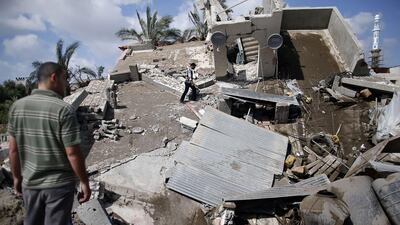GAZA CITY // Israel resumed attacks on Gaza Tuesday afternoon after Hamas failed to stop its rocket attacks in line with an Egyptian ceasefire plan.
Israeli forces had suspended strikes on the Gaza Strip in the morning in accordance with the Egyptian proposal, announced late on Monday night. However, militants in the Hamas-run enclave continued firing rockets, resulting in the first Israeli fatality.
“This would have been better resolved diplomatically, that’s what we tried to do when we accepted the Egyptian truce proposal today,” Israeli prime minister Benjamin Netanyahu said in remarks broadcast on Tuesday evening. “But Hamas leaves us no choice but to expand and intensify the campaign against it.”
There was confusion among Hamas’ ranks over the ceasefire proposal, which called for a de-escalation by both sides starting at 9am on Tuesday and a full cessation of fighting 12 hours later.
Saying they had only found out about the proposal from media reports, Hamas officials in Gaza, as well as its armed wing, refused to accept the deal.
The Ezzedine Qassam Brigades, Hamas’s militant wing, said their attacks on Israel would “increase in ferocity and intensity”.
However, on his Facebook page, the Cairo-based deputy head of Hamas’ political bureau said the group had “yet to take an official position on the initiative”.
“We’re still in consultations,” wrote Moussa Abu Marzouk.
The ceasefire proposal sought to end eight days of rocket fire from Gaza into Israel and Israeli strikes on the territory that have killed nearly 200 Palestinians and injured more than 1,400. The first Israeli fatality came on Tuesday when a rocket killed a 38-year-old man who was delivering food to soldiers. Four Israelis have also been seriously wounded.
The United Nations aid agency for Palestinians on Tuesday described the damage wrought by the Israeli offensive on Gaza as “immense”, with more than 500 homes razed.
“The level of human losses and destruction in Gaza is really immense,” said Sami Mshasha, a spokesperson for the UNRWA.
Militants in Gaza have fired more than 1,000 rockets since July 8 that have reached farther into Israel than during previous hostilities. On Tuesday, rockets from Gaza reportedly reached the northern city of Haifa, about 164 kilometres north of the besieged Palestinian territory.
The failure to agree on a ceasefire heightens the possibility that Israel, which has already mobilised 38,000 reservists, would send ground forces to invade Gaza.
The United States and other international players have urged against an ground attack on Gaza. But the US secretary of state, John Kerry, on Tuesday defended Israel and its adherence to the Egyptian truce proposal.
“I cannot condemn strongly enough the actions of Hamas in so brazenly firing rockets, in multiple numbers, in the face of a goodwill effort [to secure] a ceasefire,” said Mr Kerry.
A US senate panel also backed a defence-spending bill that would double the amount of money for Israel’s Iron Dome missile defence system. The defence bill will provide $351 million for Iron Dome, double what the Obama administration requested.
Germany’s foreign minister, Frank-Walter Steinmeier, accused Hamas of holding Gaza’s 1.7 million people “hostage” in the conflict.
“We all wish to lower the flames, we want an end to the fighting and we hope to see it soon. But there can be no compromise with terror. A ceasefire must be on these terms: No more rockets. No more terror.”
The fighting has strained a reconciliation accord achieved last month between Hamas and Fatah, which runs parts of the Israeli-occupied West Bank.
The Islamist group has also seen its ties with Cairo wane after Egypt’s military deposed Mohammed Morsi, a Muslim Brotherhood member and ally of Hamas, from the presidency last summer, and destroyed tunnels that fed cheap goods into Gaza.
Ihab Ghusain, a Hamas spokesman, called the proposed ceasefire a “conspiracy” between the Egyptian government and Israel that also included the head of the Fatah faction, Palestinian Authority president Mahmoud Abbas.
“Sadly, this includes Mahmoud Abbas,” he said.
“This is another way to give Israel a green light to continue and even expand its aggression on Gaza.”
Hamas took control of Gaza from Fatah forces in 2007. This prompted Israel to impose a siege on the territory, which Egypt has tightened after Mr Morsi’s overthrow. On Tuesday, Palestinian health minister Jawad Awad – considered close to Fatah – cancelled a trip to Gaza City’s Shifa hospital after protesters threw shoes and eggs at his car as he entered Gaza from Egypt.
Mr Ghusain said that any ceasefire with Israel had to include conditions that Hamas had made clear at the beginning of the recent round of fighting.
These include a halt to Israeli attacks on Palestinians in Gaza and the West Bank, a release of Palestinian prisoners and a lifting of the siege on Gaza.
hnaylor@thenational.ae
*Additional reporting by Reuters, Associated Press, and Agence France-Presse

